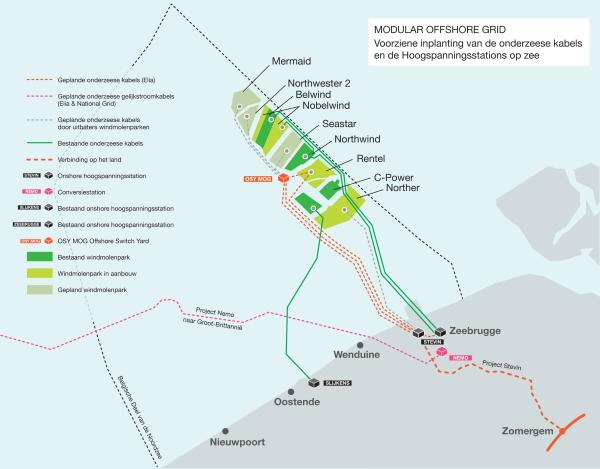
The European Investment Bank (EIB) and Elia, the operator of the Belgian high-voltage grid, have concluded a loan agreement for 100 million euros with a tenor of 7 years. This loan will be used primarily for financing the Stevin project; this includes bringing ashore the wind energy produced at sea and the optimal integration of the future energy-exchange with the UK (Nemo project) in the Belgian electricity network.
These two projects enable both the integration of large quantities of renewable energy and an integrated European electricity system and thus support the reliability of the Belgian electricity system. The Stevin project shall, among other things, enable the integration of large quantities of offshore wind energy thanks to a double 380 kV line that runs via Zeebrugge to Zomergem (47 km) and distributes the generated electricity across the Belgian electricity network. The construction is in its final stage, as the infrastructure is currently being tested and will be put into service at the end of 2017. The Nemo-link project shall also connect to the Stevin route; it is the first interconnector with Great Britain which is being built in collaboration with the British transmission operator National Grid.
Pim van Ballekom, Vice-President of the EIB responsible for Belgium, said this about the operation: “Since 2009, the EIB has invested more than two billion euros in renewable energy in Belgium, for example in the recently completed Nobelwind wind park near Oostende. It is important that this energy is transmitted as efficiently as possible to the national network and that is what this loan is all about.”
Catherine Vandenborre, CFO Elia: “The energy transition means that more and more thermal power-plants that emit CO2 are replaced by wind and solar energy. We consequently need more transport capacity to bring renewable energy to the consumer. Stevin will as well enable the interconnection with the UK, which gives Belgium an even more central role in the European energy system.”
The project emphasises, in addition to the importance of renewable energy, the certainty of the electricity provision in the region, both important priorities in the EIB investment policy. After the project is completed, offshore wind energy will be better integrated into the Belgium energy supply and via the connection with the UK, surplus production can be better traded from 2019 onwards.

Photographer: Tim Smit ©Elia
Download original